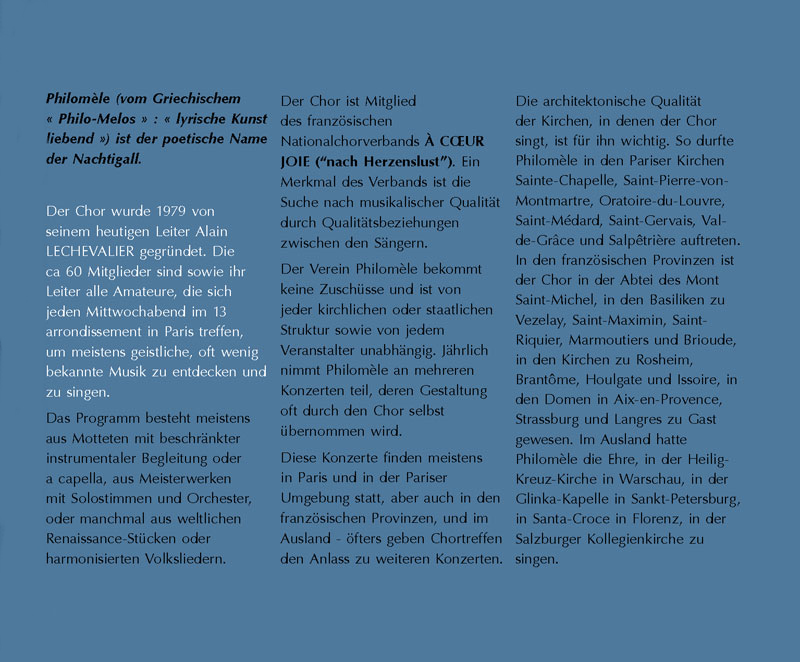|
The Ensemble Choral Philomèle, consisting of some sixty amateur choristers, was created in 1979 by its current conductor Alain Lechevalier, who is also an amateur. The choir meets weekly in the 13th arrondissement of Paris to discover and practice a repertoire mainly composed of religious music which is to be performed in concerts, either a capella or with limited accompaniment.
The choir also performs a large number of pieces from the standard repertory of works for choirs, soloists and orchestra, including many of the great classics as well as lesserknown works to which the choir enjoys introducing the audience and shorter, less ceremonial pieces. The choir also likes to sing secular Renaissance pieces and harmonised folksongs.
The Ensemble Choral Philomèle is a non-profit-making organisation, and
|
is part of the A CŒUR JOIE Movement, whose spirit very much inspires the group, as it seeks to foster enjoyable relations between choristers as well as a satisfying musical quality. This means that the choir does not select members so much for their compétence in musical theory but rather for their firm commitment to regular attendance and participation in various activities. The fact that the Ensemble is an association makes it totally independent in terms of musical choice and the practical organisation of activities.
The choir gives numerous concerts each year in Paris and the surrounding area, in the provinces and abroad (Switzerland, the UK, the Czech Republic, Poland and Russia) during get-togethers or exchanges with other choirs.
These trips, and the « return matches », when hosting foreign
|
choirs in Paris, are very special occasions that forge strong friendship and enable everyone to discover new music or introduce other choirs to a new repertoire.
The choir likes to choose places whose architectural and acoustic qualities enhance appreciation of the music performed. For example in Paris : the Sainte-Chapelle, Saint-Médard, Saint-Louis-en-l’Ile, Saint-Pierre-de-Montmartre, and further afield in Vézelay, the abbey of Mont-Saint-Michel, Strasbourg and Aix-en-Provence cathedrals, the churches of Dôle, Ebersmunster and Solignac, the abbey of Valloires, the chapel of the château d’Angers, and many lesserknown but highly appealing places. Abroad, the choir performed in the Sainte-Croix Church in Warsaw, the Kapella Glinka in Saint-Petersburg, Santa-Croce in Florence, and in the Kollegienkirche at Salzburg.
|
|

